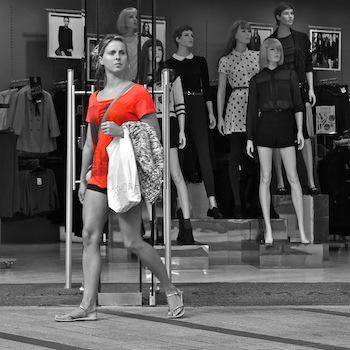
The sales results of Black Friday and Cyber Monday confirm new consumer behavior -- meaning business must change to grow sales. This new sales reality is based upon Americans consuming better. The question is, will consuming better will be enough to restore our economy, human health and the environment?
Holiday shopping season results
This holiday sales season is being driven by consumers prudently managing their purchases around a target budget. In response retailers are pushing ever larger price discounts to win their share of the consumer’s procurement budget. A marketshare price war is now a business norm. The consequences are continued weak economic growth plus an ongoing business focus upon cost reduction to maintain profit margins that does not bode well for 2015 wage increases.
The other business reality from today's holiday season is that price discounting alone no longer guarantees sales success. Consumers are exercising higher expectations on how a product aligns with their values on quality, service, health, wellness and environmental/social responsibility. Consumers want it all. They want heavy price discounts on products that align with their values. This holiday shopping season is confirming that sales success now depends upon offering consumers “cost less, mean more” products and services.
Consuming better and sustainability
This holiday shopping season again confirms that consumers have not adopted sustainability as a core best practice. The American consumer has accepted that they must consume better. They are shopping with more financial prudence. They are consuming better by focusing upon whether a product aligns with their values. What the vast majority of consumers have not embraced is sustainable consumption with a focus upon reduce, reuse and repurpose.
Consuming better is a step toward sustainability
Behavioral economics suggests that sustainable consumption by consumers will require their adoption of a new cultural norm. Consuming better is an important step toward achieving this norm. The reality is that consumer shopping will never go away because it enables a positive social experience, it creates a sense of success and is a form of entertainment. Shopping is fun.
What has changed is that consumers are more aware of the cost that shopping for fun has upon their finances, health and the environment. Consumers are demanding heavy price discounting so they can continue to enjoy shopping within their budget constraints. The increased consumer awareness of the social and environmental impacts of shopping is influencing what they buy and who they buy from. As a result they are shopping better by buying products that are more sustainably produced and/or disposed of at the end of use. They are buying products that have strong links to their wellness and that of their loved ones. In a remarkably short period of time the American consumer has adopted consuming better as a cultural norm.
The consumer sustainability question
The consumer sustainability issue is whether shopping will transition from consuming better to consuming sustainably? This behavioral economics question is driven by how much pain is required to reshape human behavior. Economic history suggests it will require a lot of pain over an extended period of time. For example, organizations like the AAA advocated for automobile seat belts in the early 1900s. The behavioral economics of seat belt adoption was that America had to experience 50,000 ANNUAL lives lost to vehicle accidents before consumer/voter pressures resulted in thirty-four states adopting seat belt mandates in 1989. Today automobile safety is a key marketing feature promoted to consumers.
There is growing evidence that sustainable consumption will follow a similar behavioral economics path where a small group of advocates and consumers eventually influence a mass-market cultural change. For example, McDonald’s and Coca Cola are facing revenue erosion as consumers shift their consumption to healthy food sustainably sourced. Even with this shift in consumer awareness/consumption, the customers of McDonald's and Coca Cola still annually buy billions of dollars of unsustainably sourced food with identified human health impacts. Rooftop solar sales in California are another example. Sales are soaring as homeowners gain confidence that rooftop solar systems can permanently lower electric bills and emissions. Yet non-renewable electricity is still the majority source of electricity used in America’s greenest state.
So even with the evidence of substantial progress, will consumer's behavior change come too late to stall irreversible climate change and species extinction?
Bill Roth is an economist and the Founder of Earth 2017. He coaches business owners and leaders on proven best practices in pricing, marketing and operations that make money and create a positive difference. His book, The Secret Green Sauce, profiles business case studies of pioneering best practices that are proven to win customers and grow product revenues. Follow him on Twitter: @earth2017

Bill Roth is a cleantech business pioneer having led teams that developed the first hydrogen fueled Prius and a utility scale, non-thermal solar power plant. Using his CEO and senior officer experiences, Roth has coached hundreds of CEOs and business owners on how to develop and implement projects that win customers and cut costs while reducing environmental impacts. As a professional economist, Roth has written numerous books including his best selling The Secret Green Sauce (available on Amazon) that profiles proven sustainable best practices in pricing, marketing and operations. His most recent book, The Boomer Generation Diet (available on Amazon) profiles his humorous personal story on how he used sustainable best practices to lose 40 pounds and still enjoy Happy Hour!














